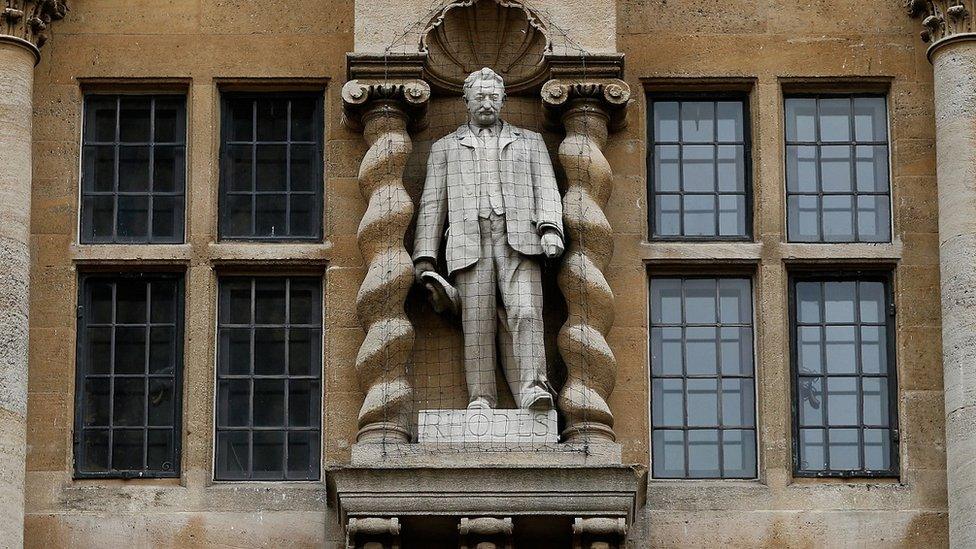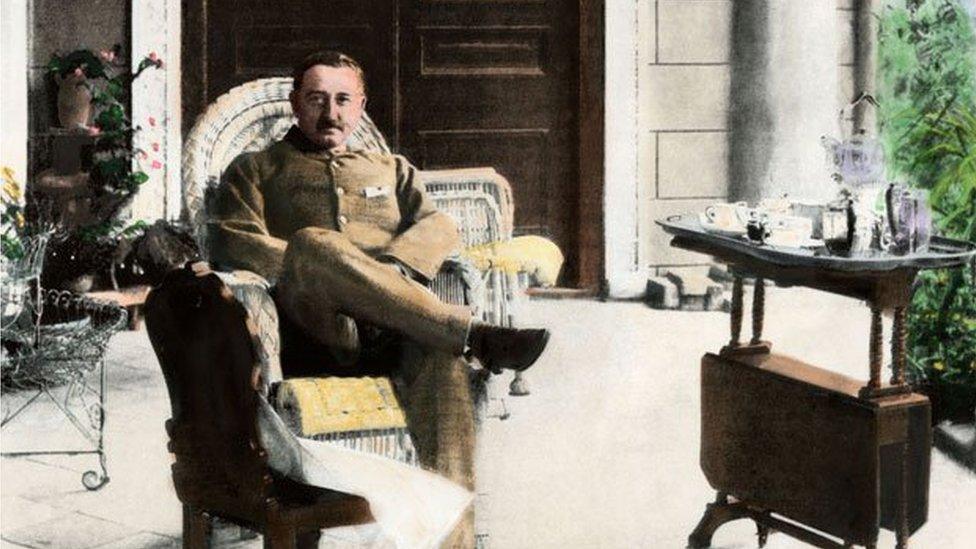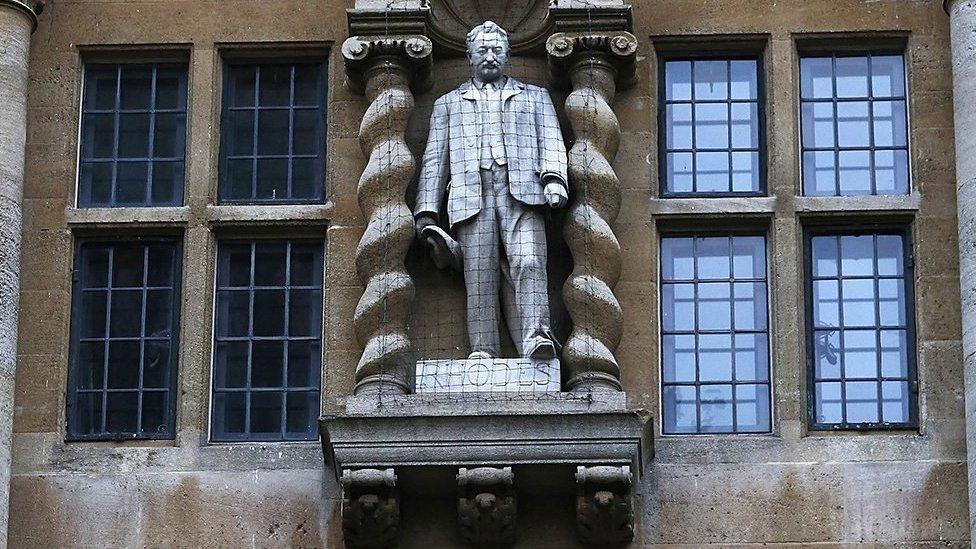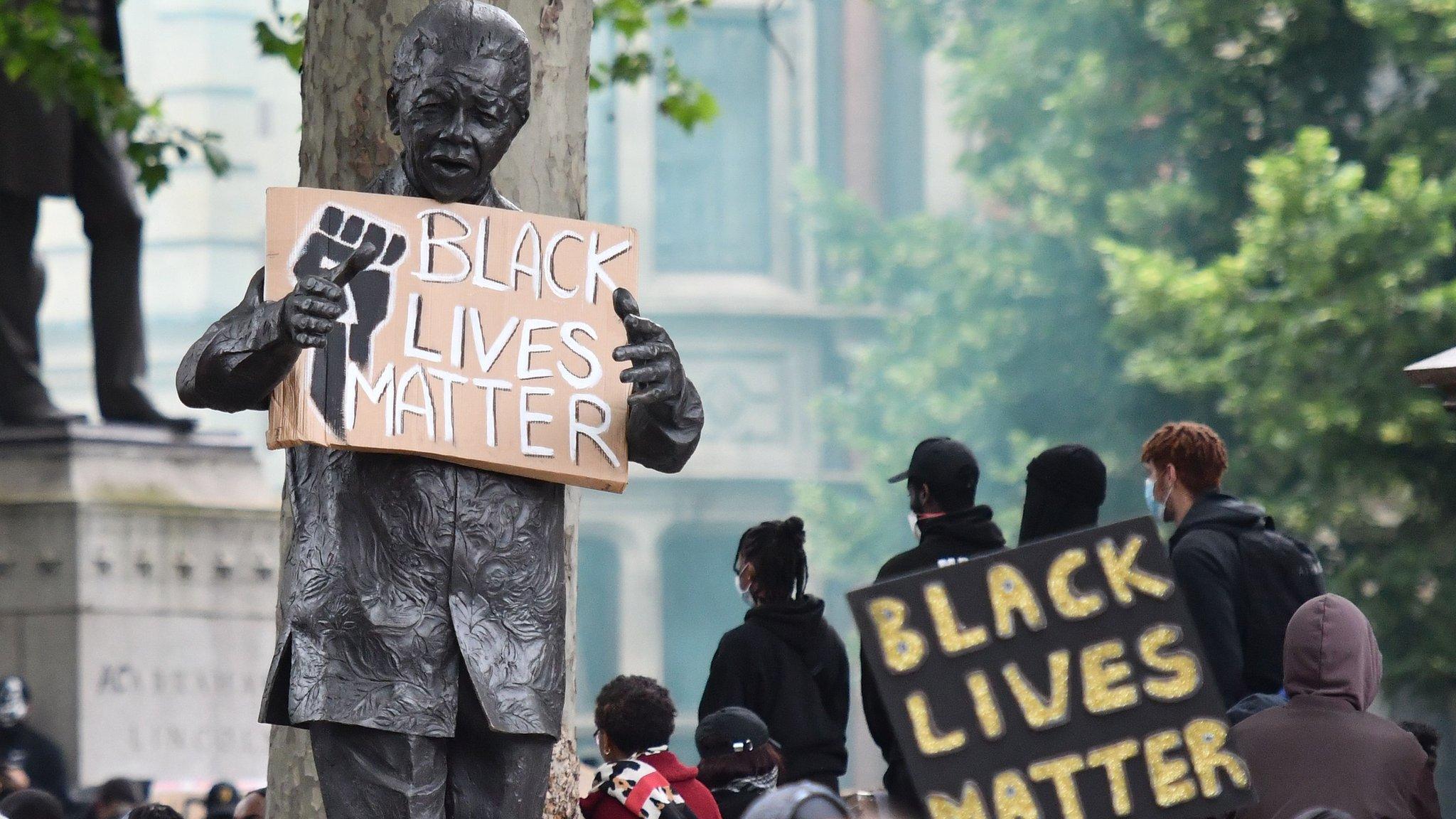Cecil Rhodes protesters continue fight after vote to remove statue
- Published

Protesters have been calling for an Oxford college's statue of Cecil Rhodes to be removed for several years
Campaigners have said protests will continue while the controversial statue of colonialist Cecil Rhodes remains at Oxford's Oriel College, after governors voted on Wednesday to remove it.
The college says there will need to be consultations over planning regulations before it can be taken down.
Sizwe Mpofu-Walsh, a founder of the Rhodes Must Fall campaign, said they felt "greatly vindicated" by the vote.
But he said it was crucial the college followed through on its plan.
Rhodes played a key role in the expansion of the British Empire in Southern Africa, including South Africa and Zimbabwe, previously known as Rhodesia.
Critics accuse the campaign of trying to "rewrite history", while campaigners for the statue's removal say it is a symbol of imperialism and racism.
Responding to Wednesday's vote, Rhodes Must Fall said that until the statue "ceases to adorn the facade of Oriel College on Oxford's High Street" there would still be protests over "imperial and colonial iconography" in university buildings.
"We have been down this route before, where Oriel College has committed to taking a certain action, but has not followed through," a statement read, referring to a commitment to engage in a "six-month-long democratic listening exercise" in 2015.
"Therefore, while we remain hopeful, our optimism is cautious. While the governing body of Oriel College have 'expressed their wish' to take down the statue, we continue to demand their commitment."

Protesters in Oxford said the statue was no longer acceptable
Oriel College's governors said the decision had been reached "after a thoughtful period of debate and reflection" - and in "full awareness of the impact these decisions are likely to have in Britain and around the world".
The college is to launch an "independent commission of inquiry" into the legacy of Cecil Rhodes, which also includes scholarships at the university.
The commission, to be headed by Carole Souter, master of St Cross College and former National Lottery Heritage Fund chief, will also consider wider issues, such as support for black and ethnic minority students and a commitment to "diversity".
It will consult with groups including students, local people, councillors and the Rhodes Must Fall campaigners.

Who was Cecil Rhodes?

Cecil Rhodes was an imperialist, businessman and politician.
Born in Hertfordshire in 1853, he first went to Africa aged 17 where he gradually became the dominant force in the diamond mining trade.
He was a strong advocate for colonial power in Africa and played a dominant role in southern Africa in the late 19th Century, driving the annexation of vast swathes of land.
He believed he was part of "the first race in the world", writing to a friend that "the more of the world we inhabit the better it is for the human race".
Some see him as one of the people who helped prepare the way for South Africa's apartheid by working to alter laws on voting and land ownership.
Rhodes, who studied at Oriel College, left money to the college on his death in 1902. The Rhodes scholarships, created via his will, allow 83 students to come to Oxford each year.
He said in life that he wanted to cheat the constraints of mortality by leaving a legacy.
Read more about him here.

Former Oxford student and campaigner Mr Mpofu-Walsh said those who pushed for the removal of the Rhodes statue "feel greatly vindicated that their position has been given a much fairer hearing this time around".
But he said it was "crucially important, even at this moment of celebration" to make sure Oriel College removed the statue.
Speaking on BBC Radio 4's Today programme, he said the objective of the college's commission was "quite vague" but he hoped it would focus on how the college can become more representative.
When asked about the Rhodes scholarships, Mr Mpofu-Walsh said: "We need to be very careful here about suggesting that Rhodes could atone for his legacy through a handful of scholarships for people from Africa. The legacy of Rhodes extends wide and deep.
"Any number of scholarships cannot account for the full scale of the horror that many of those people have felt."
What do we do with the UK's symbols of slavery?
The fate of the statue has divided opinion.
Susan Brown, leader of Oxford City Council, backed the decision to take down the statue - and said the college's inquiry would be a chance to decide where the statue will "best be curated in future".
Labour MP Bell Ribeiro-Addy called it the "right decision" on Twitter, external, adding that it was "time to take figures like Rhodes down off their pedestals".
Alan Rusbridger, principal of Lady Margaret Hall in Oxford, also welcomed the decision.
Allow X content?
This article contains content provided by X. We ask for your permission before anything is loaded, as they may be using cookies and other technologies. You may want to read X’s cookie policy, external and privacy policy, external before accepting. To view this content choose ‘accept and continue’.

'Generosity'
However, former Conservative MEP Daniel Hannan tweeted that "Rhodes's generosity allowed thousands of young people to enjoy an education they could not otherwise have had".
Allow X content?
This article contains content provided by X. We ask for your permission before anything is loaded, as they may be using cookies and other technologies. You may want to read X’s cookie policy, external and privacy policy, external before accepting. To view this content choose ‘accept and continue’.

Earlier on Wednesday, the universities minister had spoken against calls to remove the statue.
Michelle Donelan said: "Racism is abhorrent and shouldn't be tolerated anywhere in our society, and that includes universities."
But she said it would be "short sighted" to try to "rewrite our history" - and rejected attempts to "censor or edit" the past.
'Hiding' the past
Last week the vice-chancellor of Oxford University, Louise Richardson, gave little support for removing the statue - and warned against "hiding" the past.
"My own view on this is that hiding our history is not the route to enlightenment," Prof Richardson told BBC News.
"We need to understand this history and understand the context in which it was made and why it was that people believed then as they did," she said.
"This university has been around for 900 years. For 800 of those years the people who ran the university didn't think women were worthy of an education. Should we denounce those people?
"Personally, no - I think they were wrong, but they have to be judged by the context of their time," said Prof Richardson.
- Published11 June 2020

- Published15 June 2020
